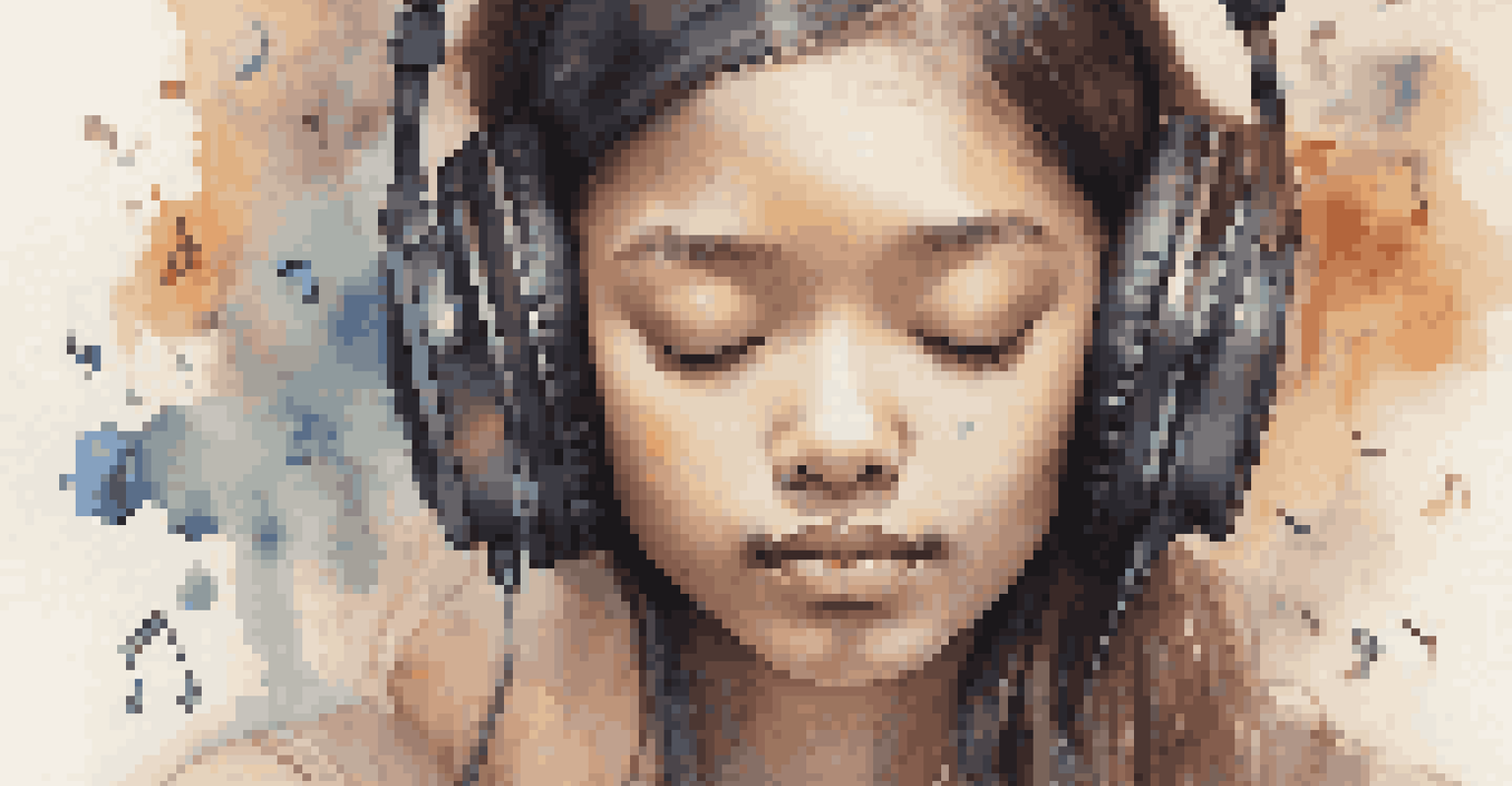The Impact of Music on Cultural Identity in the Digital Age

Music as a Cultural Cornerstone in the Digital Realm
Music has always been a vital part of cultural identity, reflecting values, traditions, and experiences. In the digital age, it acts as a bridge connecting diverse communities, allowing individuals to explore and celebrate their heritage. For instance, platforms like Spotify and YouTube enable users to access a vast array of genres and styles from around the globe, fostering a sense of belonging and understanding.
Music is the shorthand of emotion.
As people discover music that resonates with their personal stories, they often share it on social media, creating a ripple effect of cultural exchange. This sharing not only promotes individual expression but also strengthens communal ties, as playlists and recommendations can highlight cultural narratives that might otherwise remain unnoticed. In this context, music becomes a living archive of cultural memory.
Moreover, the evolution of music genres, influenced by technology and globalization, showcases how cultural identity is dynamic rather than static. Genres like reggaeton, which blend Latin rhythms with hip-hop elements, illustrate how cultures can intermingle and give birth to new identities. This ongoing evolution invites everyone to participate in shaping cultural narratives, making music a powerful tool for identity formation.
The Role of Social Media in Musical Discovery
Social media platforms have revolutionized how we discover and engage with music, making it easier than ever to connect with artists and genres from around the world. TikTok, for example, has turned obscure tracks into viral sensations, often rooted in specific cultural contexts. This phenomenon not only elevates the visibility of diverse music styles but also encourages users to embrace different aspects of cultural identity.

As users create and share content featuring these songs, they contribute to a larger conversation about culture and identity. Hashtags and challenges allow participants to express their interpretations and personal connections to the music, creating a communal experience that transcends geographical boundaries. This interaction fosters a sense of global citizenship, where everyone can share in the celebration of varied cultural expressions.
Music Connects Diverse Cultures
In the digital age, music serves as a bridge connecting communities, allowing individuals to explore and celebrate their cultural heritage.
However, this digital exposure also raises questions about cultural appropriation versus appreciation. As audiences engage with music from various cultures, it's essential to recognize and respect the origins of these sounds. Understanding the context behind a song can deepen appreciation and encourage a more authentic connection, ensuring that cultural identities are honored rather than exploited.
The Influence of Streaming Services on Music Access
Streaming services have democratized music access, allowing listeners to explore global sounds without the barriers of geography or cost. With a simple subscription, users can dive into playlists curated to showcase different cultural backgrounds, opening doors to musical traditions they may have never encountered otherwise. For example, exploring Afrobeat or K-pop can spark interest in the cultures from which these genres originate.
The beautiful thing about music is that it transcends language.
Moreover, algorithms that recommend music based on listening habits help listeners discover tracks that resonate with their identity, preferences, and experiences. This tailored experience can enhance cultural connections, as users find music that reflects their stories and emotions. In this way, streaming services not only provide entertainment but also serve as platforms for cultural exploration.
However, while streaming has its advantages, it also poses challenges for artists and cultural creators who may struggle to gain fair compensation. As the industry shifts towards digital platforms, it is crucial to advocate for equitable systems that support artists from various cultural backgrounds. Ensuring that these creators receive recognition and reward for their contributions is vital for preserving the rich tapestry of global music.
Music Festivals as Cultural Celebrations
Music festivals have become vibrant showcases of cultural identity, bringing together diverse communities to celebrate their heritage. Events like Coachella, Glastonbury, and local cultural festivals feature a mix of artists that reflect a wide range of musical traditions. These gatherings not only entertain but also educate attendees about different cultures, fostering an appreciation for global diversity.
At these festivals, attendees often engage in cultural practices beyond just music, such as art, food, and dance, creating an immersive experience. This multi-sensory engagement allows individuals to connect with cultures on a deeper level, promoting a sense of empathy and understanding. For many, these experiences serve as a catalyst for exploring their own cultural roots.
Social Media Transforms Music Discovery
Platforms like TikTok have revolutionized music discovery, making it easier for users to engage with diverse genres while fostering cultural exchange.
Moreover, festivals can also act as platforms for social change, as artists use their performances to raise awareness about cultural issues and injustices. By weaving messages into their music, they inspire listeners to reflect on their own identities and the world around them. This blend of celebration and activism highlights the powerful role that music plays in shaping cultural identities in the modern age.
The Interplay of Music and Identity in Youth Culture
For many young people, music is a primary means of expressing and exploring their identities. Whether through fashion, dance, or lyrics, music becomes a canvas on which they paint their personal and cultural narratives. Genres often resonate with specific youth subcultures, allowing individuals to find a sense of belonging among like-minded peers.
In the digital age, platforms like Instagram and TikTok amplify this connection, enabling youth to share their musical tastes and creative expressions with a wider audience. This not only strengthens their sense of identity but also fosters a supportive community where cultural exchanges flourish. Young people can celebrate their uniqueness while discovering common threads with others across the globe.
However, this dynamic also presents challenges, as the pressure to conform to popular trends can sometimes overshadow authentic self-expression. As youth navigate these influences, it becomes crucial to encourage them to embrace their individuality while appreciating the diversity of musical cultures around them. By fostering an environment of acceptance and exploration, we can help young people cultivate a rich sense of cultural identity through music.
Globalization: A Double-Edged Sword for Music and Culture
Globalization has significantly impacted the music industry, creating opportunities for cross-cultural collaboration while also posing risks to local musical traditions. On one hand, artists from different backgrounds can come together to create innovative sounds that blend cultural elements. This collaboration can strengthen cultural identities by showcasing their richness on a global stage.
On the other hand, the dominance of certain music styles on global platforms can overshadow local genres, leading to homogenization. When mainstream music tends to favor a specific sound, lesser-known cultural expressions may struggle to gain visibility. It's essential to find a balance that allows diverse musical traditions to coexist while also evolving in response to changing audiences.
Streaming Services Shape Access
Streaming services democratize music access, enabling listeners to explore global sounds and connect with different cultural identities.
Navigating this landscape requires awareness and intentionality from both creators and consumers. Supporting local artists and advocating for inclusive representation can help preserve unique cultural identities while contributing to a vibrant global music scene. By valuing diversity and actively engaging with different musical traditions, we can ensure that the richness of cultural identity remains alive and well in the digital age.
The Future of Music and Cultural Identity
As technology continues to evolve, the relationship between music and cultural identity will likely grow even more intricate. Innovations like virtual reality concerts and AI-generated music are already changing how we experience and interact with sound. These advancements could provide new avenues for cultural expression, allowing artists to reach audiences in ways previously unimaginable.
However, with these changes come responsibilities to ensure that cultural identities are honored and preserved. As creators experiment with new technologies, it is crucial to remain mindful of the cultural contexts behind the music. By fostering respect and understanding, we can prevent exploitation and appreciate the depth of cultural narratives that music embodies.

Ultimately, the future of music and cultural identity will depend on our collective choices. By embracing the diversity of sounds and stories, and advocating for equitable practices in the music industry, we can create a rich tapestry of cultural expression that reflects our shared humanity. Music will continue to be a powerful vehicle for identity in the digital age, shaping who we are and how we connect with one another.